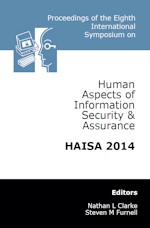In 2014, we launched our open-access repository which offers full text access to conference proceedings from many of our events including the INC and HAISA series. These papers are free to access and distribute (subject to citing the source).
» Openaccess proceedings » Eighth International Symposium on Human Aspects of Information Security & Assurance (HAISA 2014)
 | Eighth International Symposium on Human Aspects of Information Security & Assurance (HAISA 2014) |
Title: Developing contextual understanding of information security risks
Author(s): Moufida Sadok, Vasilios Katos, Peter Bednar
Reference: pp1-10
Keywords: Risk analysis, Systemic risk, Cognitive map, Contextual analysis, Information security, Uncertainty
Abstract: Given the uncertainty and complexity of security risk analyses, there is a great need of tools for contextual inquiry supporting assessment of risk with multi-value scales according to different stakeholders’ point of view. Such tools can be used at individual level to help develop the understanding of a problem space. At the collective level, they can be used as a mean of communication to support the discussion, comparison and exploration of different understandings. The exploration of multiple perspectives of contextual understanding avoids entrapment in various types of reductionism and eliminates tendencies towards a deterministic reasoning and the pursuit of one optimum solution. A critical challenge is first developing a large spectrum of alternatives and then managing how the differences and similarities between alternatives will be handled to efficiently support decisions in information systems security (ISS). To address the aforementioned challenges, this paper seeks to explore the potential relevance of cognitive maps use in an ISS context to support the exploration of individual understanding leading to richer elaboration of problem spaces.
Download count: 2075
How to get this paper:


PDF copy of this paper is free to download. You may distribute this copy providing you cite this page as the source.
